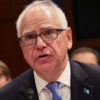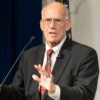When was the last time a journalist asked a question about federalism in a presidential debate? Answer: 1960.
The American news media, much like American politicians, are less and less attuned to what the Constitution actually says and more and more focused on the often vague notion of “rights.”
News reporters, editors and producers are quick to wade into what they see as a juicy conflict over rights denied — at least those they ascribe to “community organizers” or atheists or gay activists or abortion clinics. The media don’t tend to give serious scrutiny to the structure and limits of government power actually prescribed by the Constitution.
Today, Constitution Day, is a good day to highlight the results of some related media research by Andrew E. Busch, an associate professor of political science at Claremont McKenna College.
In a Lexis/Nexis search of the major media for mentions of constitutional issues during a period of six months, Busch discovered news organizations to be “much more interested in rights than in structural questions.”
Federalism, “one of the most important structures of the American republic,” was mentioned in a modest 116 articles — and many of those stories were about federalism in Canada.
The biggest hits:
• Civil rights, civil liberties and abortion (1,000-plus articles).
• Gay or same-sex marriage (500).
• Constitutional amendments and Supreme Court appointments (426 each).
• The First Amendment (326), Roe v. Wade (241), and sovereignty questions raised by the International Criminal Court (134).
Busch reports that no other searches for 33 key words produced more than 100 hits, including “war powers,” “Kelo” (the notorious property rights case), “Electoral College amendments,” “original intent” or “Supreme Court appellate jurisdiction.”
He observes:
Much evidence points to a cohort of party activists who are more ideological and more polarized today than in
1960. This trend helps to explain both the increase in constitutional discourse in elections since 1960 and why it is
that party platforms have more such discourse than alternative forms of campaign communication. Activists write
the platforms — and are almost the only ones who read them.”































5 Replies to “How the Constitution Makes News”